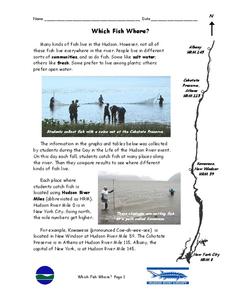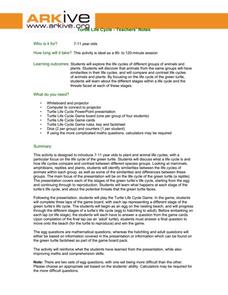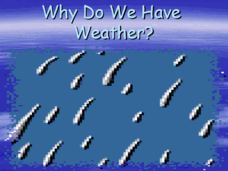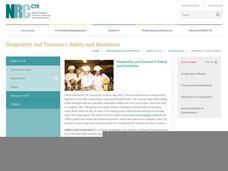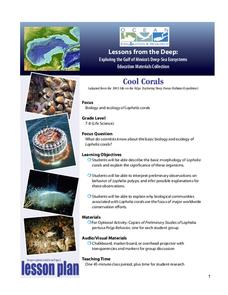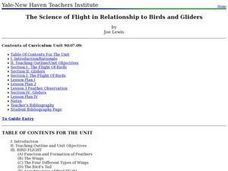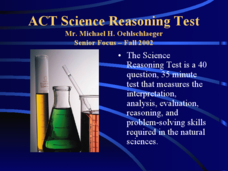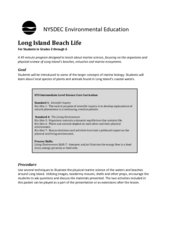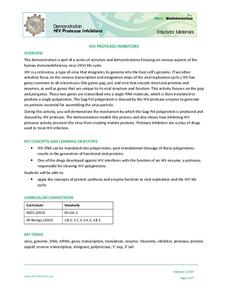NASA
The Cycle of Matter
An educational lesson focuses on the idea of conservation of matter through a demonstration of the water cycle, a discussion of digesting food, and the path of carbon and oxygen atoms as they change form.
Curated OER
Which Fish Where?
Focusing on the fish in the Hudson River Estuary, this activity could be used to practice reading, graphing ,and critical-thinking skills. Answering the 6 questions should be interesting for students due to the interesting subject matter.
National Park Service
Fire Ecology on the Rim
An engaging unit on wildfires includes three sections, including a background section with eight lessons and five activities, a field experience section with 13 lessons and five activities, and a conclusion section featuring an analysis...
ARKive
Turtle Life Cycle
Explore the wonders of the life cycle by first focusing on the growth and development of the green turtle. The class will discuss the life cycle of different plants and animals, then turn their attention to the green turtle. They view a...
NOAA
To Explore Strange New Worlds
It's time to boldly go where your class has not gone before! The introductory lesson in a five-part series takes young oceanographers aboard the NOAA Ship Okeanos to begin a study of ocean exploration. The lesson includes a comparison of...
Curated OER
Exploring Biomes Lesson 1: Mapping Biomes
Environmental science learners examine satellite imagery of temperature, vegetation, precipitation, and productivity. They use these maps to understand how scientists divide the planet into major biomes. As part of a larger unit on...
CK-12 Foundation
Microscopes: Focal Point
The 1590s saw the invention of the first compound microscope. Scholars learn about how microscopes work and how to properly focus one. The lesson stresses the science fields that use microscopes and the difference between electron...
Curated OER
Why Do We Have Weather?
Convection is offered as the reason behind our weather phenomena. This presentation assumes that viewers are familiar with the methods of heat transfer, and is therefore more geared toward middle-school meteorologists. The focus is on...
National Research Center for Career and Technical Education
Hospitality and Tourism 1: Safety and Sanitation
Math and science come alive in this career-related instructional activity on sanitation. Along the way, learners explore bacterial growth rates using exponential notation and graphs. A link to a very brief, but vivid video shows just how...
NOAA
Deep-Sea Ecosystems – Life is Weird!
A pool of brine in the deep sea can be up to four times as salty as the surrounding sea water. The deep sea ecosystem relies on chemosynthesis and the organisms that live there are often strange to us. The lesson focuses on researching...
Curated OER
Design a Reef!
Using a miniature coral reef aquarium kit, young ecologists model this unique ecosystem. They research various coral reef organisms and their niches, and they culminate the project by working together to write a report. Use this activity...
NOAA
Deep-Sea Ecosystems – Cool Corals
Young oceanographers research deep sea corals that thrive on chemosynthesis. The lesson focuses on the biology of the animal, preferred habitat, associations, and interactions.
NOAA
Where Have All the Glaciers Gone?
What happens when ice melts? Well ... water happens. When that melting ice is a glacier, the amount of water that results produces change throughout the world. Middle school science sleuths uncover the truth about global warming, the...
NOAA
What Killed the Seeds?
Can a coral cure cancer? Take seventh and eighth grade science sleuths to the underwater drugstore for an investigation into emerging pharmaceutical research. The fifth installment in a series of six has classmates research the wealth of...
Curated OER
The Science of Flight in Relationship to Birds and Gliders
Students study man's first form of flight which truly imitated the free-flight of birds--the glider. They examine such important contributions to the invention of the glider, such as Sir George Cayley, Jean Marie LeBris, Otto Lilienthal...
Curated OER
ACT Science Reasoning Test
The types of scientific information that need to be analyzed in the ACT test are presented here. Tips and techniques for completing the research, data, viewpoints, and multiple choice questions will help your class and their expectations.
Mr. E. Science
Magnetism and Electromagnetism
The biggest magnet in the world is at the Los Alamos National Laboratory in New Mexico and can reach 100 tesla. By comparison, magnets that lift cars are about two tesla. The 11th presentation in this series covers magnetism, focusing on...
Curated OER
Long Island Beach Life
Have your class learn about marine life through this resource. This comprehensive lesson has learners discuss marine life, learn key vocabulary, discuss environmental concerns, and play games related to migration and predator/prey...
Curated OER
Sizing Up The Solar System
Students investigate and design various models of size and distance related to the solar system. They work together to build a solar system model. The models should focus on distance and scale. They don't include moons or satellites in...
Howard Hughes Medical Institute
HIV Protease Inhibitors
How do doctors fight a virus that's constantly mutating? Show science scholars how we fight HIV using one of its own most fundamental processes through a thoughtful demonstration. The lesson focuses on how protease inhibitors prevent HIV...
University of California
Hot! Hot! Hot!
Calories are not tiny creatures that sew your clothes tighter every night, but what are they? A science activity, presented at multiple levels, has learners experiment with heat, heat transfer, and graph the function over time. It also...
Cornell University
Plant Cell Crime Scene
Use science to solve the mystery of the Poplar murder. Pupils use forensic botany to determine if a suspect could be the killer. By analyzing images from a Transmission Electron Microscope, learners determine if the material found on the...
Curated OER
Arkansas State Mineral: Quartz Mineral
The quartz crystals found in the mountains of Arkansas are among the purest and clearest in the world! This lesson has middle schoolers focus on this state mineral of Arkansas as they study the state's geography. A fun game is...
Curated OER
Human Cheek Cell
Get up close and personal with human cells with this lab worksheet. Learners use a microscope to examine their own cheek cells, drawing diagrams of the cells and identifying the parts when they have focused in on a visible specimen....



